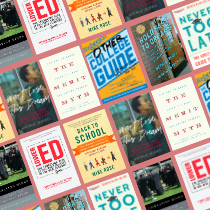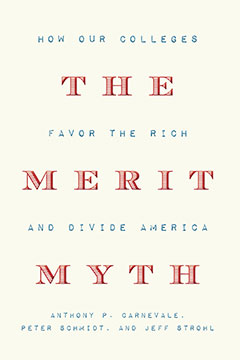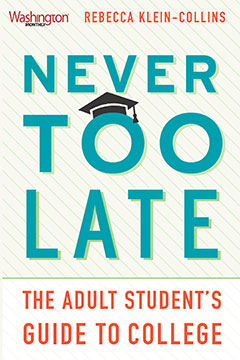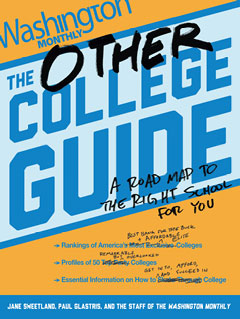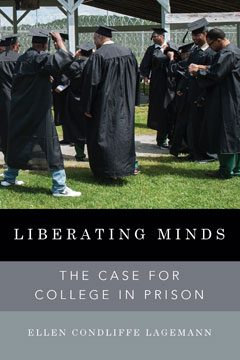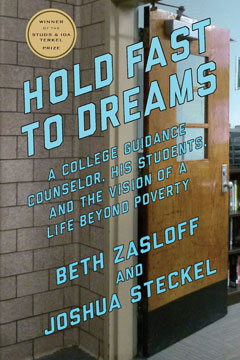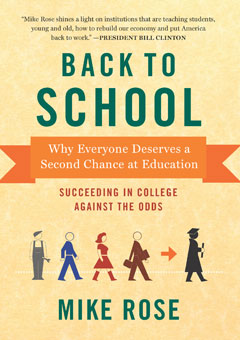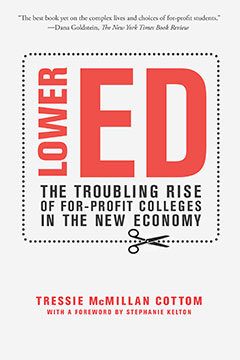When most Americans think of college, they conjure pre-pandemic images of young adults fresh out of high school strolling across bucolic residential campuses and enjoying student life in dorms. After all, a college education is often touted as a shining pathway to success. While education is proven to be transformative, securing a degree and navigating the institutions that grant them can be fraught for many students, especially first-generation, minority, and low-income students. Too often higher education institutions utterly fail to meet their students’ actual needs and live up to the ideals they champion, instead reinforcing a system that exacerbates inequality. The pandemic offers the United States a massive and crucial opportunity to reimagine higher education that lives up to its name. We can’t get this wrong. This reading list, of books that range from the shocking and eye-opening to practical and prescriptive, highlight the failures of the system, the pitfalls facing students, and offers solutions for rethinking the university and raising student access and achievement.
* * * * * * *

By Andrew Gumbel
The extraordinary story of how Georgia State University, once just another unglamorous urban university, tore up the rulebook for educating lower-income students by harnessing the power of evolving data technologies, a “moneyball” strategy that helped them recognize and remove the obstacles that have held poor students back. GSU has raised its graduation rate and, since 2014, has awarded more bachelor’s degrees to African Americans than any other nonprofit college or university in the country. In Won't Lose This Dream veteran journalist Andrew Gumbel uncovers the human stories behind these innovations, tracing real students as they realize lifelong dreams of graduating from college.
By Anthony P. Carnevale, Peter Schmidt, and Jeff Strohl
Colleges fiercely defend America’s higher education system, arguing that it rewards bright kids who have worked hard. But it doesn’t actually work this way. As the recent bribery scandal demonstrates, social inequalities and colleges’ pursuit of wealth and prestige stack the deck in favor of the children of privilege. The Merit Myth delves deeply into the rampant dysfunction of higher education and argues for unrigging the game by dramatically reducing the weight of the SAT/ACT; measuring colleges by their outcomes, not their inputs; designing affirmative action plans that honor the relationship between race and class; and making 14 the new 12—guaranteeing every American a public K–14 education.
By Tressie McMillan Cottom, with a foreword by Stephanie Kelton
More than two million students are enrolled in for-profit colleges, from the small family-run operations to the behemoths brandished on billboards, subway ads, and late-night commercials. With sharp insight and deliberate acumen, Tressie McMillan Cottom—a former recruiter at two for-profit colleges and author of the award-winning
Thick: And Other Essays—expertly parses the fraught dynamics of this big-money industry to show precisely how it is part and parcel of the growing inequality plaguing the country. Drawing on more than one hundred interviews with students, employees, executives, and activists,
Lower Ed details the benefits, pitfalls, and real costs of the expansion of for-profit colleges.
By Rebecca Klein-Collins
As anyone who has done it knows, going back to school is a major undertaking. For younger and older adults alike, starting or returning to school presents different challenges than those encountered by teens fresh out of high school and heading straight to college. Countless Americans take on this task while working, raising kids, caring for parents, volunteering, serving in the military—and in some cases all of the above. Although the “non-traditional” undergraduate student is in fact the new normal, the glut of college guides out there don’t include practical advice for these students. Never Too Late is a smart, snappy, and comprehensive guide for the millions of adults who are thinking about going—or are going back—to college and want to know how to do it right.
By Jane Sweetland and Paul Glastris
A college degree has never been more important—or more expensive. Where can you get an amazing education without your parents having to remortgage the house or cash in their retirement fund? Which degrees will allow you to fulfill your dreams and earn a decent paycheck? Now, from the staff of the Washington Monthly comes a new kind of college guide, inspired by and including the magazine’s signature alternative college rankings. All things being unequal, The Other College Guide will provide you—and your families and counselors—with the honest and practical information you need to make sense of the college process and carve a path to the future you imagine.
By Ellen Condliffe Lagemann
College-in-prison programs greatly reduce recidivism, leading to potential savings in the staggering cost of prisons. They increase post-prison employment, allowing the formerly incarcerated to better support their families and to reintegrate successfully into their communities, providing positive role models. College programs also decrease violence within prisons, improving conditions for both correction officers and the incarcerated. In Liberating Minds, Ellen Condiffe Lagemann, former dean of the Harvard Graduate School of Education, eloquently makes the case for these multiple benefits and also tells the stories of many formerly incarcerated college students and the remarkable transformations in their lives.
By Beth Zasloff and Joshua Steckel
When Joshua Steckel left his job as a private school college counselor on New York City’s Upper East Side to work at a public high school in Brooklyn, he discovered that for low-income students the competitive game of college admissions has entirely different rules and much higher stakes. The winner of the
Studs and Ida Terkel Prize,
Hold Fast to Dreams—which Kirkus Reviews called “a powerful story of courage and hope that should inspire others to follow trailblazers like Steckel and his students”—traces the pathways of ten of Josh’s students from their obstacle-ridden application processes through their life-changing college experiences.
By Mike Rose
It’s a statistic that’s sure to surprise: close to 45 percent of postsecondary students in the United States today do not enroll in college directly out of high school and many attend part time. Through rich and moving vignettes of “second-chancers” struggling to make their way, Back to School explores what higher education―in the fullest sense of the term―can offer our rapidly changing society and why it is so critical to support the institutions―the community colleges and adult education programs―that make it possible for millions of Americans a shot at reaching their aspirations.
